| Listing 1 - 10 of 36 | << page >> |
Sort by
|
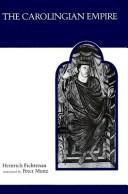
ISBN: 0802063675 Year: 1982 Publisher: University of Toronto press
Abstract | Keywords | Export | Availability | Bookmark
 Loading...
Loading...Choose an application
- Reference Manager
- EndNote
- RefWorks (Direct export to RefWorks)
Carolingians --- Carlovingians --- Carolinians --- Europe --- Histoire --- Moyen age
Book
ISBN: 1282398482 9786612398483 9047433408 9789047433408 9789004166691 9004166696 Year: 2008 Publisher: Leiden Boston Brill
Abstract | Keywords | Export | Availability | Bookmark
 Loading...
Loading...Choose an application
- Reference Manager
- EndNote
- RefWorks (Direct export to RefWorks)
This book is not a conventional political narrative of Carolingian history shaped by narrative sources, capitularies, and charter material. It is structured, instead, by numismatic, diplomatic, liturgical, and iconographic sources and deals with political signs, images, and fixed formulas in them as interconnected elements in a symbolic language that was used in the indirect negotiation and maintenance of Carolingian authority. Building on the comprehensive analysis of royal liturgy, intitulature, iconography, and graphic signs and responding to recent interpretations of early medieval politics, this book offers a fresh view of Carolingian political culture and of corresponding roles that royal/imperial courts, larger monasteries, and human agents played there.
Herrschaft. --- Politisches Symbol. --- Carolingians --- Civilization, Medieval. --- Political culture --- Symbolism in politics --- Civilization, Medieval --- Medieval civilization --- Middle Ages --- Civilization --- Chivalry --- Renaissance --- Culture --- Political science --- Symbolic politics --- Carlovingians --- Carolinians --- History. --- History --- Fränkisches Reich.
Book
ISBN: 9783486701661 3486701665 9783486597585 Year: 2010 Publisher: München, Germany
Abstract | Keywords | Export | Availability | Bookmark
 Loading...
Loading...Choose an application
- Reference Manager
- EndNote
- RefWorks (Direct export to RefWorks)
zur ersten Auflage ""Die Ausführungen Hechbergers zu seinem komplexen Gegenstand sind durchweg klar strukturiert, stringent in der Gedankenführung und konzise in der Formulierung. Die Art und Weise, wie er überblicksartig ein weites und facettenreiches Forschungsfeld absteckt, zeugt von imponierender Belesenheit und souveräner Kenntnis der Materie, die wissenschaftliche Beiträge präzise zu resümieren und sicher in größere Zusammenhänge einzuordnen versteht."" Tobias Weller, H-Soz-u-Kult, Februar 2005 Werner Hechbergers kompakte Einführung in die Geschichte des Adels im Mittelalter bietet einen
Nobility --- Knights and knighthood --- Ministerials --- Civilization, Medieval. --- Carolingians. --- Carlovingians --- Carolinians --- Civilization, Medieval --- Medieval civilization --- Middle Ages --- Civilization --- Chivalry --- Renaissance --- Estates (Social orders) --- Feudalism --- Knighthood --- Heraldry --- Orders of knighthood and chivalry --- History. --- History --- Nobility Germany --- Germany
Book
ISBN: 1851821538 9781851821532 Year: 1994 Publisher: Dublin Four courts press
Abstract | Keywords | Export | Availability | Bookmark
 Loading...
Loading...Choose an application
- Reference Manager
- EndNote
- RefWorks (Direct export to RefWorks)
940.11 --- Germanic peoples --- Carolingians --- Oral tradition --- -Tradition, Oral --- Oral communication --- Folklore --- Oral history --- Carlovingians --- Carolinians --- Germanic tribes --- Ethnology --- Indo-Europeans --- Teutonic race --- Geschiedenis van Europa:--ca.375-843 --- Europe --- Rome --- Council of Europe countries --- Eastern Hemisphere --- Eurasia --- History --- -History --- -940.11 --- -Geschiedenis van Europa:--ca.375-843 --- 940.11 Geschiedenis van Europa:--ca.375-843 --- -Carlovingians --- Tradition, Oral --- Rim --- Roman Empire --- Roman Republic (510-30 B.C.) --- Romi (Empire) --- Byzantine Empire --- Rome (Italy) --- -Germanic peoples --- -Europe --- -History -
Book
ISBN: 9780801447716 0801447712 1322505063 0801460174 9780801460173 0801477883 9780801477881 Year: 2009 Publisher: Ithaca Cornell University Press
Abstract | Keywords | Export | Availability | Bookmark
 Loading...
Loading...Choose an application
- Reference Manager
- EndNote
- RefWorks (Direct export to RefWorks)
Despite the wealth of scholarship in recent decades on medieval women, we still know much less about the experiences of women in the early Middle Ages than we do about those in later centuries. In Women and Aristocratic Culture in the Carolingian World, Valerie L. Garver offers a fresh appraisal of the cultural and social history of eighth- and ninth-century women. Examining changes in women's lives and in the ways others perceived women during the early Middle Ages, she shows that lay and religious women, despite their legal and social constrictions, played integral roles in Carolingian society. Garver's innovative book employs an especially wide range of sources, both textual and material, which she uses to construct a more complex and nuanced impression of aristocratic women than we've seen before. She looks at the importance of female beauty and adornment; the family and the construction of identities and collective memory; education and moral exemplarity; wealth, hospitality and domestic management; textile work, and the lifecycle of elite Carolingian women. Her interdisciplinary approach makes deft use of canons of church councils, chronicles, charters, polyptychs, capitularies, letters, poetry, exegesis, liturgy, inventories, hagiography, memorial books, artworks, archaeological remains, and textiles. Ultimately, Women and Aristocratic Culture in the Carolingian World underlines the centrality of the Carolingian era to the reshaping of antique ideas and the development of lasting social norms.
Carolingians. --- Civilization, Medieval. --- Social history --- Upper class women --- Women --- History --- History of Europe --- anno 500-1499 --- Femmes --- Femmes de la classe supérieure --- Carolingiens --- Histoire sociale --- Civilisation médiévale --- Histoire --- Civilization, Medieval --- Medieval civilization --- Middle Ages --- Carlovingians --- Carolinians --- Civilization --- Chivalry --- Renaissance

ISBN: 3515042024 Year: 1986 Publisher: Stuttgart Steiner
Abstract | Keywords | Export | Availability | Bookmark
 Loading...
Loading...Choose an application
- Reference Manager
- EndNote
- RefWorks (Direct export to RefWorks)
Historical linguistics --- Dialectology --- Germanic languages --- Romance languages --- History of Europe --- anno 500-1499 --- Carolingians --- Carlovingians --- Carolinians --- Germany --- Moselle River Valley --- -Moselle River Valley --- -Rhineland (Germany) --- -Rheinland (Germany) --- Moselle Valley --- History --- -Civilization --- Intellectual life --- Civilization --- Carolingians. --- -History --- Rhineland (Germany) --- Rheinland (Germany) --- Civilization. --- Intellectual life.
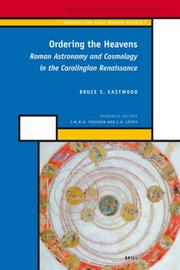
ISBN: 9789004161863 9004161864 9786611936563 1281936561 9047431073 9789047431077 9781281936561 6611936564 Year: 2007 Volume: 8 4 Publisher: Leiden Brill
Abstract | Keywords | Export | Availability | Bookmark
 Loading...
Loading...Choose an application
- Reference Manager
- EndNote
- RefWorks (Direct export to RefWorks)
The astronomy of the Carolingian era has commonly been represented as concerned exclusively with computus , the science of calendar construction as well as arithmetical calculation in general. This volume shows the error of that portrayal by exploring the study and teaching of four Roman texts on astronomy and cosmology in the Carolingian world and the diagrams connected to those texts. As each of these works came into use over the Carolingian era, its contributions merged into a progressively more ordered picture of the heavens. Both eccentrics and epicycles appeared by the 840s. These techniques were subsequently introduced clearly and qualitatively to complete the Carolingian enterprise. The primary tool for understanding this effort is the analysis of their diagrams. Medieval and Early Modern Science , volume 8
520.94 --- Sciences Astronomy History Europe --- Planetary theory --- Astronomy, Medieval --- Cosmology, Medieval. --- Carolingians. --- History. --- Astronomy, Medieval. --- Astronomy, Medieval -- Europe. --- Cosmology, Medieval -- Europe. --- Planetary theory -- History. --- Cosmology, Medieval --- Carolingians --- Astronomy & Astrophysics --- Physical Sciences & Mathematics --- Theoretical Astronomy --- Astronomy - General --- History --- Planets, Theory of --- Celestial mechanics --- Medieval cosmology --- Carlovingians --- Carolinians --- Medieval astronomy
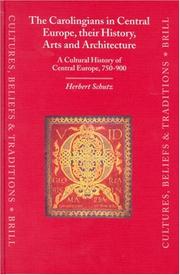
ISBN: 1280467592 9786610467594 1423714563 9047402359 9781423714569 9789047402350 9789004131491 9004131493 9004131493 Year: 2004 Publisher: Leiden Boston Brill
Abstract | Keywords | Export | Availability | Bookmark
 Loading...
Loading...Choose an application
- Reference Manager
- EndNote
- RefWorks (Direct export to RefWorks)
This work presents an historical overview of the Frankish realms in Central Europe during the Carolingian period. It examines the cultural inventory deposited by the scribal culture in Central Europe as represented by manuscripts, crystals, ivories, and gem incrusted liturgical art.
Carolingians. --- Civilization, Medieval. --- Culture diffusion --- Art, Carolingian. --- Architecture, Carolingian. --- Learning and scholarship --- Cultural diffusion --- Diffusion of culture --- Culture --- Social change --- Civilization, Medieval --- Medieval civilization --- Middle Ages --- Civilization --- Chivalry --- Renaissance --- Carlovingians --- Carolinians --- Medieval learning and scholarship --- Education, Medieval --- Architecture, Carlovingian --- Carolingian architecture --- Architecture, Medieval --- Art, Carlovingian --- Carolingian art --- Art, Medieval --- History --- Europe, Central --- History.
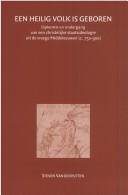
ISBN: 9065506357 9789065506351 Year: 2001 Volume: 74 Publisher: Hilversum Verloren
Abstract | Keywords | Export | Availability | Bookmark
 Loading...
Loading...Choose an application
- Reference Manager
- EndNote
- RefWorks (Direct export to RefWorks)
History of Europe --- Christian church history --- anno 700-799 --- anno 800-899 --- Carlovingians --- Carolingians --- Carolingiens --- Carolinians --- Droit franc --- Empire carolingien --- Empire d'Occident --- Empire franc --- Franc [Empire ] --- Francs--Droit --- Franken--Recht --- Frankisch recht --- Frankish law --- Franks--Law --- Karolingers --- Law [Frankish ] --- Occident [Empire d' ] --- Recht [Frankisch ] --- Saint Empire romain germanique -- 800-924 (Carolingiens) --- Geschiedenis van de Middeleeuwen --- Histoire du Moyen Age --- Histoire ecclésiastique --- Kerkgeschiedenis --- Church and state --- Eglise et Etat --- History --- Histoire --- Europe --- Politics and government --- Church history --- Politique et gouvernement --- Histoire religieuse --- 930.86.01 --- -Church history --- -Christianity and state --- Separation of church and state --- State and church --- State, The --- Christianity --- Ecclesiastical history --- History, Church --- History, Ecclesiastical --- Mentaliteitsgeschiedenis:--Middeleeuwen --- -History --- Carolingians. --- -Mentaliteitsgeschiedenis:--Middeleeuwen --- -930.86.01 --- 930.86.01 Mentaliteitsgeschiedenis:--Middeleeuwen --- -Carlovingians --- Christianity and state --- Middle Ages, 600-1500 --- Kingdom of God --- History of doctrines --- Middle Ages, 500-1500 --- Church and state - History - To 1500 --- Church history - Middle Ages, 600-1500
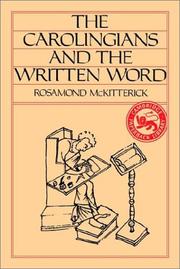
ISBN: 0521315654 052130539X 0511583591 0511097115 9780521305396 9780521315654 9780511583599 Year: 1989 Publisher: Cambridge Cambridge University Press
Abstract | Keywords | Export | Availability | Bookmark
 Loading...
Loading...Choose an application
- Reference Manager
- EndNote
- RefWorks (Direct export to RefWorks)
This pioneering book studies the function and status of the written word in Carolingian society in France and Germany in the eighth- and ninth-centuries. It demonstrates that literacy was by no means confined to a clerical élite, but was dispersed in lay society and used for government and administration, and for ordinary legal transactions among the peoples of the Frankish kingdom. While exploiting a huge range of primary material, Professor McKitterick does not confine herself to a functional analysis of the written word in Carolingian northern Europe but goes on to assess the consequences and implications of literacy for the Franks themselves and for the subsequent development of European society after 1000. Key topics discussed include law and the use of the written word, the conduct and record of legal transactions, the economic and social status of the book in Carolingian society, the methods evolved to organize and define written knowledge, and the whole question of lay literacy.
940.13 --- 091 =71 --- 930.85:02 --- Geschiedenis van Europa:--481-843 --- Handschriftenkunde. Handschriftencatalogi--Latijn --- Cultuurgeschiedenis. Kultuurgeschiedenis-:-Bibliotheekwezen --- Carolingians. --- Learning and scholarship --- Literacy --- Written communication --- History --- History. --- 930.85:02 Cultuurgeschiedenis. Kultuurgeschiedenis-:-Bibliotheekwezen --- 091 =71 Handschriftenkunde. Handschriftencatalogi--Latijn --- 940.13 Geschiedenis van Europa:--481-843 --- Carolingians [Dynasty] --- Illiteracy --- General education --- -Carolingians. --- -940.13 --- -Geschiedenis van Europa:--481-843 --- -Carlovingians --- Carolingians --- Carlovingians --- Carolinians --- Written discourse --- Written language --- Communication --- Discourse analysis --- Language and languages --- Visual communication --- Education --- Medieval learning and scholarship --- Education, Medieval --- History of civilization --- anno 700-799 --- anno 800-899 --- Communication écrite --- Alphabétisation --- Carolingiens --- Histoire --- Europe --- Written communication - Europe - History. --- Literacy - Europe - History. --- Cultuurgeschiedenis --- Karolingen [Dynastie] --- Arts and Humanities --- Written communication - Europe - History --- Learning and scholarship - History - Medieval, 500-1500 --- Literacy - Europe - History
| Listing 1 - 10 of 36 | << page >> |
Sort by
|

 Search
Search Feedback
Feedback About UniCat
About UniCat  Help
Help News
News